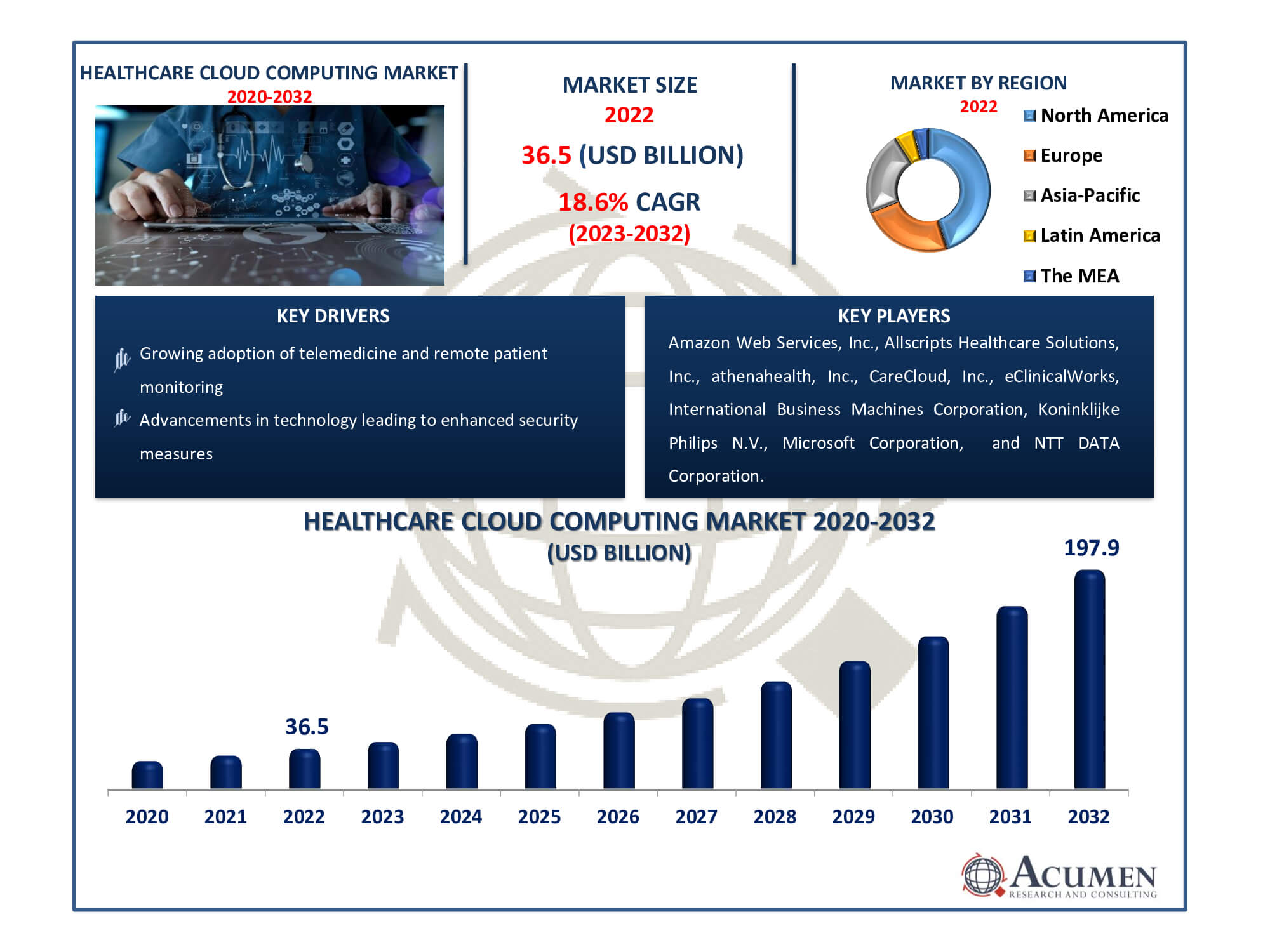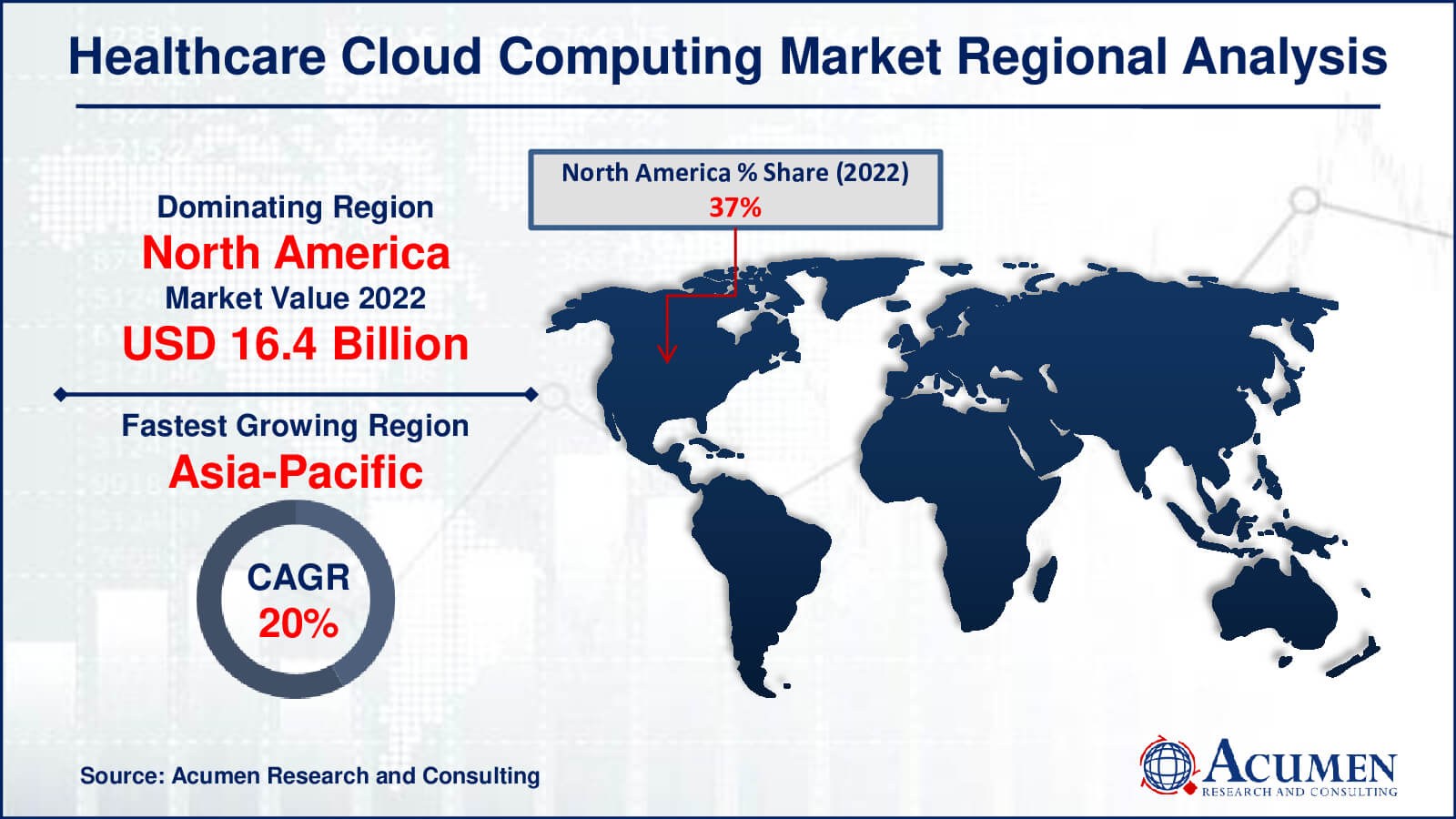Healthcare Cloud Computing Market Size - Global Industry, Share, Analysis, Trends and Forecast 2023 - 2032
Published :
Report ID:
Pages :
Format :
Healthcare Cloud Computing Market Size - Global Industry, Share, Analysis, Trends and Forecast 2023 - 2032
Report Coverage
- Industry Dynamics
- Market Size and Forecast Data
- Segment Analysis
- Competitive Landscape
- Regional Analysis with a Niche Focus on Country-Level Data
- High Level Analysis - Porter's, PESTEL, Value Chain, etc.
- Company Profiles of Key Players
- Option to Customize the Report As Per Your Specific Need
Request Sample Report
The Healthcare Cloud Computing Market Size accounted for USD 36.5 Billion in 2022 and is estimated to achieve a market size of USD 197.9 Billion by 2032 growing at a CAGR of 18.6% from 2023 to 2032.
Healthcare Cloud Computing Market Highlights
- Global healthcare cloud computing market revenue is poised to garner USD 197.9 billion by 2032 with a CAGR of 18.6% from 2023 to 2032
- North America healthcare cloud computing market value occupied around USD 16.4 billion in 2022
- Asia-Pacific healthcare cloud computing market growth will record a CAGR of more than 20% from 2023 to 2032
- Among component, the services sub-segment generated over US$ 22.3 billion revenue in 2022
- Based on application, the nonclinical information systems sub-segment generated around 67% share in 2022
- Collaboration among industry stakeholders to develop standardized cloud solutions is a popular healthcare cloud computing market trend that fuels the industry demand

The use of distant servers to store, manage, and access healthcare data and services via the internet is referred to as healthcare cloud computing. It provides healthcare organizations with safe and scalable platforms for storing electronic health records (EHRs), running applications, and facilitating cooperation among medical specialists. This technology improves data accessibility, streamlines administrative processes, and allows for the deployment of cutting-edge healthcare solutions while adhering to tight privacy and security standards. Enhanced healthcare infrastructure welcomes the adoption of cloud computing, revolutionizing the traditionally sluggish administrative processes within healthcare organizations into more efficient data transport and storage facilities. A centralized database that maintains a patient's comprehensive health records, accessible across all relevant hospitals, and provides real-time updates on their current medical conditions, serves as a valuable resource for pharmacologists and medical practitioners alike.
Global Healthcare Cloud Computing Market Dynamics
Market Drivers
- Increasing demand for data storage and accessibility in healthcare
- Advancements in technology leading to enhanced security measures
- Growing adoption of telemedicine and remote patient monitoring
- Cost-effectiveness and scalability of cloud-based solutions
Market Restraints
- Concerns regarding data security and privacy
- Resistance to adopting new technologies in established healthcare systems
- Regulatory compliance challenges in different regions
Market Opportunities
- Expansion of healthcare IT infrastructure in emerging markets
- Development of specialized cloud solutions for healthcare needs
- Integration of artificial intelligence and machine learning for healthcare analytics
Healthcare Cloud Computing Market Report Coverage
| Market | Healthcare Cloud Computing Market |
| Healthcare Cloud Computing Market Size 2022 | USD 36.5 Billion |
| Healthcare Cloud Computing Market Forecast 2032 | USD 197.9 Billion |
| Healthcare Cloud Computing Market CAGR During 2023 - 2032 | 18.6% |
| Healthcare Cloud Computing Market Analysis Period | 2020 - 2032 |
| Healthcare Cloud Computing Market Base Year |
2022 |
| Healthcare Cloud Computing Market Forecast Data | 2023 - 2032 |
| Segments Covered | By Component, By Deployment, By Application, By End Use, And By Geography |
| Regional Scope | North America, Europe, Asia Pacific, Latin America, and Middle East & Africa |
| Key Companies Profiled | Amazon Web Platform as a Service [PaaS], Inc., Allscripts Healthcare Solutions, Inc., athenahealth, Inc., CareCloud, Inc., eClinicalWorks, International Business Machines Corporation, Koninklijke Philips N.V., Microsoft Corporation, NTT DATA Corporation, and Siemens Healthineers AG. |
| Report Coverage |
Market Trends, Drivers, Restraints, Competitive Analysis, Player Profiling, Covid-19 Analysis, Regulation Analysis |
Healthcare Cloud Computing Market Insights
The healthcare industry's anticipated growth in the coming years is largely driven by the increased adoption of cloud computing software among healthcare professionals. Recently developed cloud computing software has seen widespread use in hospitals and laboratories for efficient patient data management. With vast amounts of data generated annually from clinical and administrative sources in these facilities, suitable software for analysis and maintenance is imperative. This surge in demand is expected to propel growth in the healthcare cloud computing market. Leading industry players have introduced software and services facilitating the storage and integration of extensive healthcare data, further fueling industry expansion. Such software not only makes patient information readily accessible but also aids healthcare workers in making informed decisions. Additionally, the high utilization of software in cloud computing enhances hospital management and bolsters fraud prevention measures, contributing to the growth of the healthcare cloud sector.
The availability of favorable regulatory measures aimed at ensuring better quality in health cloud software is predicted to fuel market growth throughout the healthcare cloud computing industry forecast period. Regulatory bodies like the FDA in the United States and the EU Commission have enacted various laws and directives to mitigate software and system defects developed by key industry players. The authorization of healthcare cloud software marketing holds significant importance as errors in data management could have serious implications. Therefore, companies in the healthcare cloud computing sector adhere to these regulations to uphold software precision and quality, fostering business growth. However, concerns surrounding data security, given the susceptibility of software-based data to theft, may potentially impact industry growth.
Healthcare Cloud Computing Market Segmentation
The worldwide market for healthcare cloud computing is split based on component, deployment, application, end use, and geography.
Healthcare Cloud Computing Components
- Services
- Software as a Service [SaaS]
- Platform as a Service [PaaS]
- Infrastructure as a Service [IaaS]
- Software
The importance of services in the healthcare cloud industry stems from their vital contribution to customised solutions and ongoing support. Service providers provide comprehensive assistance with the deployment, management, and security of cloud infrastructure. These services include maintenance, data security, compliance adherence, and user assistance, all of which ensure that cloud systems run smoothly. Because of their critical role in offering specialised solutions adapted to the needs of the healthcare business, services are the driving force behind cloud adoption in the healthcare sector.
Healthcare Cloud Computing Deployments
- Private Cloud
- Public Cloud
- Hybrid Cloud
The private cloud's dominance stems from its specialised, secure infrastructure dedicated entirely to individual healthcare organisations. It provides unrivalled control over sensitive patient data while conforming to the most strict compliance and privacy regulations. Healthcare organisations choose the private cloud for customised solutions that ensure data sovereignty and build trust. This deployment strategy enables simple connection with current systems while ensuring strong security protocols, making it the preferred solution for healthcare data management.
Healthcare Cloud Computing Applications
- Clinical Information Systems
- Health Information System
- Radiology Information Systems
- Telehealth
- Picture Archiving & Communication System [PACS]
- Pharmacy Information Systems
- Computerized Physician Order Entry
- Laboratory Information Management System
- Ambulatory or Outpatient CI
- Nonclinical Information Systems
- Revenue Cycle Management
- Supply Chain Management Solutions
The dominance of the Nonclinical Information Systems market originates from its numerous functions that streamline administrative and operational operations in healthcare. Nonclinical information systems provide key activities including as billing, inventory management, and human resources, all of which are required for efficient healthcare operations. Their use improves administrative efficiency and resource management, raising their importance and ubiquity in the healthcare cloud computing ecosystem.
Healthcare Cloud Computing End Uses
- Hospitals
- Diagnostic & Imaging Centers
- Ambulatory Centers
- Pharmacies
The hospital category has the largest market share due to its extensive data management requirements, which include patient records, diagnostics, and administrative procedures. Cloud computing enables hospitals to handle data in a secure, scalable, and effective manner, improving patient care and operational procedures. The importance of hospitals as main end users in the healthcare cloud computing market is driven by the necessity for centralised and accessible patient data. Their dependence on cloud technology for improved patient care and streamlined operations reinforces their position as the market leader in this arena.
Healthcare Cloud Computing Market Regional Outlook
North America
- U.S.
- Canada
Europe
- U.K.
- Germany
- France
- Spain
- Rest of Europe
Asia-Pacific
- India
- Japan
- China
- Australia
- South Korea
- Rest of Asia-Pacific
Latin America
- Brazil
- Mexico
- Rest of Latin America
The Middle East & Africa
- South Africa
- GCC Countries
- Rest of the Middle East & Africa (ME&A)

Healthcare Cloud Computing Market Regional Analysis
The cloud computing market in North America surpassed USD 16 billion in 2022, and this trend is projected to persist over the forecast period. Ongoing technological advancements in cloud computing have accelerated adoption among healthcare providers in the region. Additionally, a supportive regulatory environment fosters regional growth by ensuring the availability of efficient and upgraded software.
The Asia-Pacific region is emerging as the fastest-growing area in the healthcare cloud computing market, owing to increased digitization initiatives and the use of modern technologies throughout the healthcare sector. Rising investments in healthcare IT infrastructure and healthcare providers' growing embrace of cloud-based solutions are driving the region's rapid growth. Furthermore, government attempts to modernize healthcare systems contribute considerably to Asia-Pacific's increasing adoption of cloud computing technologies. As a result, the region has a high potential for market growth and technological improvements in healthcare cloud computing solutions.
Europe's healthcare cloud computing market is expected to witness a noteworthy share over the healthcare cloud computing market forecast period due to the growing awareness of high-quality cloud services. Moreover, the rising geriatric population, prone to various diseases, is anticipated to drive increased hospital admissions, thereby fueling the demand for cloud-based healthcare software in the region.
Healthcare Cloud Computing Market Players
Some of the top healthcare cloud computing companies offered in our report include Amazon Web Services, Inc., Allscripts Healthcare Solutions, Inc., athenahealth, Inc., CareCloud, Inc., eClinicalWorks, International Business Machines Corporation, Koninklijke Philips N.V., Microsoft Corporation, NTT DATA Corporation, and Siemens Healthineers AG.
Frequently Asked Questions
How big is the healthcare cloud computing market?
The market size of healthcare cloud computing was USD 36.5 billion in 2022.
What is the CAGR of the global healthcare cloud computing market from 2023 to 2032?
The CAGR of healthcare cloud computing is 18.6% during the analysis period of 2023 to 2032.
Which are the key players in the healthcare cloud computing market?
The key players operating in the global market are including Amazon Web Services, Inc., Allscripts Healthcare Solutions, Inc., athenahealth, Inc., CareCloud, Inc., eClinicalWorks, International Business Machines Corporation, Koninklijke Philips N.V., Microsoft Corporation, NTT DATA Corporation, and Siemens Healthineers AG.
Which region dominated the global healthcare cloud computing market share?
North America held the dominating position in healthcare cloud computing industry during the analysis period of 2023 to 2032.
Which region registered fastest CAGR from 2023 to 2032?
Asia-Pacific region exhibited fastest growing CAGR for market of healthcare cloud computing during the analysis period of 2023 to 2032.
What are the current trends and dynamics in the global healthcare cloud computing industry?
The current trends and dynamics in the healthcare cloud computing industry include increasing demand for data storage and accessibility in healthcare, advancements in technology leading to enhanced security measures, growing adoption of telemedicine and remote patient monitoring, and cost-effectiveness and scalability of cloud-based solutions.
Which component held the maximum share in 2022?
The services component held the maximum share of the healthcare cloud computing industry.


